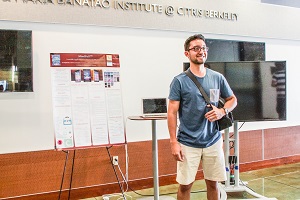 More than 10 million Americans experience depression each year. Globally, mental illnesses are projected to cost $16 trillion indirectly through lost labor and capital output. Additionally, subpar mood also reduces the quality of life of those affected. However, the gold-standard in the U.S., one- on-one therapy, is too costly and labor-intensive to keep up with the expected growth of demand. At this point, innovative solutions are needed to improve mental health care delivery and patient self-management. Because 85% of the world’s population has wireless access, mobile technologies are poised to deliver personalized self-care and relieve workforce shortages. MindFull™ is a mobile application created by medical students to boost mood and assist in the self-management of depression, anxiety, and stress. It presents evidence-based treatments as daily tasks the user can accomplish. These are portrayed as interactive, “flippable tiles” that display more information, provide scientific citations, and suggest local resources.
More than 10 million Americans experience depression each year. Globally, mental illnesses are projected to cost $16 trillion indirectly through lost labor and capital output. Additionally, subpar mood also reduces the quality of life of those affected. However, the gold-standard in the U.S., one- on-one therapy, is too costly and labor-intensive to keep up with the expected growth of demand. At this point, innovative solutions are needed to improve mental health care delivery and patient self-management. Because 85% of the world’s population has wireless access, mobile technologies are poised to deliver personalized self-care and relieve workforce shortages. MindFull™ is a mobile application created by medical students to boost mood and assist in the self-management of depression, anxiety, and stress. It presents evidence-based treatments as daily tasks the user can accomplish. These are portrayed as interactive, “flippable tiles” that display more information, provide scientific citations, and suggest local resources.
Pinoleville Pomo Nation (TELUS) (UC Berkeley)
The project is a partnership between the Pinoleville-Pomo Nation (PPN) and the University of California, Berkeley. The purpose of this project is to develop a

